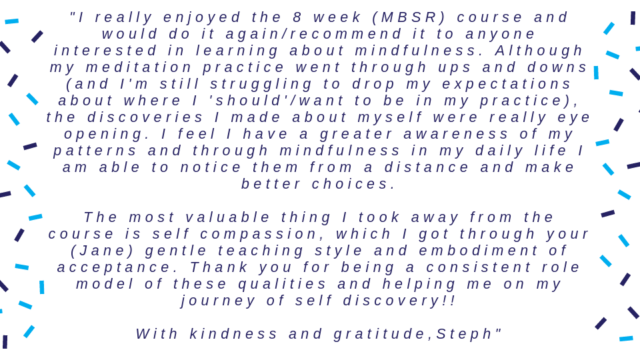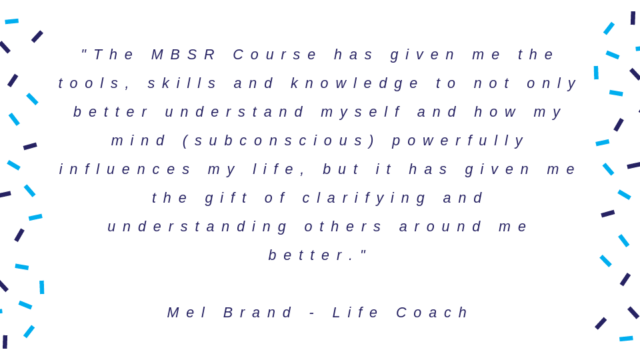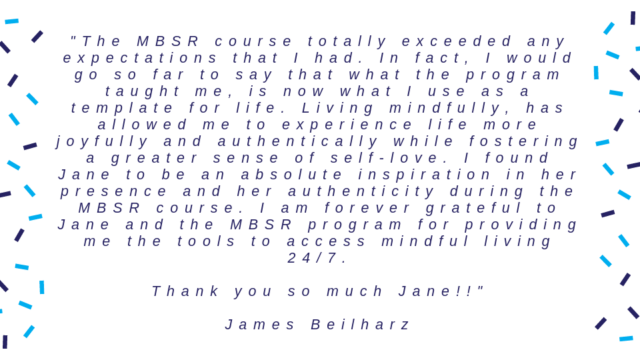Finding it hard to manage stress in your business, career or life?
Ready to start untangling comparison, fear and other draining habits?
Know it is time to go within?
Welcome to the Distance Learning 8-Week Mindfulness-Based Stress Reduction (MBSR) Course
The MBSR Course is an innovative eight-week course which supports people to cultivate mental, physical and emotional resilience and well-being.
The 8-week MBSR Course uses mindfulness practice as the core to teach people how to take better care of themselves and live healthier, more adaptive lives. It has been forged from the integration of transformative Eastern mindfulness practices with contemporary Western scientific understandings of human functioning. This fusion has produced a tailored and verifiable method for treating a wide range of difficulties and enhancing performance and engagement in life and work.
What Will You Learn?
Over the eight-week course, you learn a number of key skills that allow you to tune into and become aware of your experience in the present moment.
Firstly, you establish a routine of spending some time each day by yourself formally practicing mindfulness meditation. By choosing to engage in this practice you will learn how to cultivate deeper states of relaxation and well-being. You will also learn how to bring a moment-to-moment awareness to your experience, and then apply this awareness so you can respond - rather than react in habitual ways - to everyday life situations. This becomes much easier to do when you are regularly practicing the formal meditation each day.
The course provides an opportunity for you to examine and reflect on the patterns of your own mind, feelings and actions, and to gently interrupt patterns of self-judgment and unhelpful actions.
We learn how to accept and embrace the full range of experience that life inevitably brings - pleasurable, joyful and expansive experience as well as painful conditions in their various forms - worry, anxiety, tension, impatience, anger, grief, sadness and even despair. Moving towards these conditions with an inquiring attitude, rather than trying to hold on to them, or to escape or avoid them, can bring some surprising and refreshing results.
How does the Distance Learning 8-Week MBSR Course work?
The MBSR Course is taught through distance learning. Each week there will be a live interactive webinar.
The upcoming course dates are -
Thursday February 1 - March 21, 2024 @ 6.30pm-8.30pm (QLD Australia Time) and Online Retreat - Sunday March 3 (start 11am). Times may vary due to number of participants due to time provided for length of discussion.
Following is a brief outline of the 8-weeks -
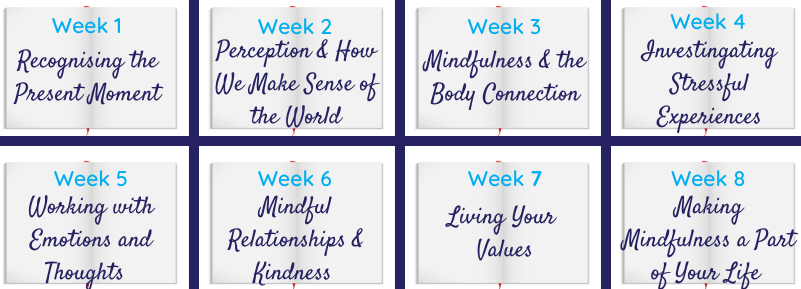
“Knowing yourself is the beginning of all wisdom.” ~ Aristotle
When you join the Distance Learning 8-Week MBSR Course, you'll benefit from -

Personal Growth & (Un)Learning
As you participate and engage in the 8-Week MBSR Course, you will discover additional self-worth and evolve as a person. Engaging with a group of like-minded people can bring a tremendous amount of personal and professional growth.

Accountability & Focus
No longer will you feel like you are trying to do it all by yourself! In the 8-Week MBSR Course, you will be part of a community learning and practising mindfulness in every day life. You just might find yourself more inspired to take action when you have a support system cheering you on!

Practice, Practice, Practice
The key to life is paying attention and being present. Yes, this can be challenging. On the surface, it can appear easier to bolt and run away (don't worry I have done that many, many times), however in the long run it doesn't work. This is why we are going to continually practice coming back to focus on yourself and your needs each week.

Energy & Flow
There may be days (or weeks) in your career or business when you do not have very much energy. However, when you are aligned with your own heart and soul and other people something happens and life starts to flow with ease and grace.

Encouragement & Support
You will have encouragement from other 8-Week MBSR Course participants. When was the last time someone gave you genuine support and celebrated your successes? In 8-Week MBSR Course, we want to share your experiences and learn with you!
What's included in the 8-Week MBSR Course via Distance Learning?
When you become a participant in the MBSR course, you will receive the following...

Who is the Distance Learning 8-Week MBSR Course for?
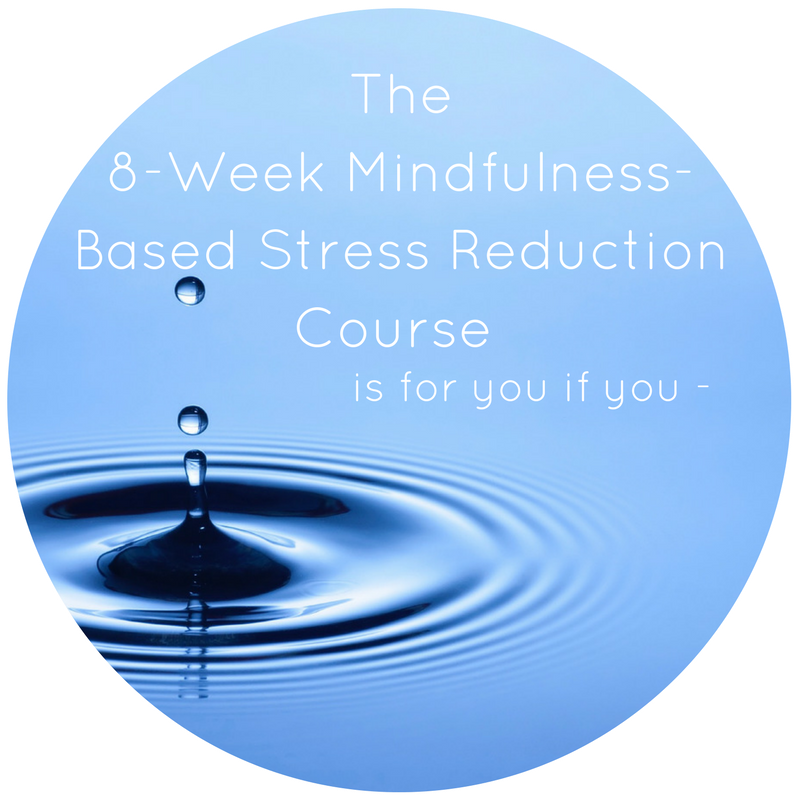
Mindfulness training is useful for a broad range of people with diverse backgrounds, ages, interests and levels of well-being. People self-refer or sometimes are referred by their doctors or psychologists because of physical and emotional stressors in their lives. Many enrol because, although they are feeling well physically, they say the pace of their lives is "out of control" or they're "just not feeling quite right" and want more ease and peace.
Mindfulness training can enhance learning, concentration, creativity, personal resilience and professional effectiveness.
For people with job, relationship and family pressures, it can help with all kinds of day-to-day stress symptoms including headaches, irritability, high-blood pressure, fatigue and sleep disturbances.
It can reduce suffering even for those with serious conditions including mild depression, anxiety and panic disorders, cancer, heart disease, diabetes, respiratory disease and chronic pain.
3 Reasons to Join the Distance Learning 8-Week MBSR Course...
There are a number of reasons to join us in the Distance Learning 8-Week MBSR Course, including -
- The Distance Learning 8-Week MBSR Course is interactive. Jane, who is an experienced mindfulness teacher will guide you over the 8 weeks. You will join a community of people learning mindfulness. The community is a safe and supportive place that will honour and recognise where you are now and continue to support and celebrate when you as you take small steps towards mindfulness.
- Draining habits (like fear, comparison and self-sabotage) are stopping you from taking the next step in your business, career or life. You cannot think your way out of these draining habits, you have to find the courage and untangle them with awareness, compassion and action. In the Distance Learning 8-Week MBSR Course we will be supporting you to take action and tap in to the power within.
- The 8-Week MBSR Course is simple (but not always easy and is actually quite challenging) and is grounded in research.
Feedback from Past Participants...
Frequently Asked Questions
The MBSR course is an 8-week, nine session course. Participants attend a 2 1/2 webinar once a week for eight weeks as well one full day session (which is between the fifth and sixth sessions). The program involves mindfulness meditation training and practice, yoga and body awareness training, exploration of patterns of thinking, feeling and action, brief lectures and group discussions - including inquiry during group time with individuals, individual feedback and support as well as a commitment from the participant to practice daily using the meditations and course notes.
You will be offered a systematic training in mindfulness - learning how to cultivate an observant, accepting and compassionate stance towards your thoughts, emotional states, body sensations and impulses. Specific information about stress physiology, cognitive behavioural strategies, interpersonal communication and implementing self-care will also be given. The core formal mindfulness practices taught include a body scan, sitting meditation with concentrative focus on the breath, mindful Hatha Yoga and sitting meditation that expands the focus of attention to choiceless awareness.
Mindfulness continues to grow throughout the world. Subsequently, there has been a lot of research on mindfulness and some of the benefits of mindfulness include:
- decreasing the symptoms of anxiety (Miller, Fletcher & Kabat-Zinn, 1995),
- increasing a sense of empathy and spirituality (Shapiro, Schwartz & Bonner, 1998),
- decreasing symptoms of chronic pain (Kabat-Zinn, Chapman & Salmon, 1987),
- reduce stress levels in healthy people (Chiesa & Seretti, 2009),
- decreasing symptoms of obsessive-compulsive disorder (Baxter et al, 1992),
- increasing well-being (Brown & Ryan, 2003),
- helpful in reducing the effects of psoriasis (Kabat-Zinn et al, 1998),
- preventing relapse in depression (Segal et al, 2007) and drug addiction (Parks, Anderson & Marlett, 2001), and
- decreasing stress and enhancing quality of life for those with breast and prostate cancer (Carlson L et al, 2007).
References -
Baxter, L., Schwartz, J., Bergman, K., Szuba, M., Guze, B., Mazziota, J. (1992). Caudate glucose metabolic rate changes with both drug and behaviour therapy for obsessive compulsive disorder. Archives of General Psychiatry, 49(9), 681-689.
Brown, K., & Ryan, R. (2003). The Benefits of Being Present: Mindfulness and its Role in Psychological Well-being. Journal of Personality and Social Psychology, 84, 822-848.
Carlson, L., Speca, M., Faris, P., & Patel, K. (2007). One-year pre-post intervention follow-up of psychological, immune, endocrine and blood pressure outcomes of mindfulness-based stress reduction (MBSR) in breast and prostate cancer outpatients. Brain, Behaviour, and Immunity, 21(8), 1038-1049.
Chiesa, A., & Serretti, A. (2009). Mindfulness-Based Stress Reduction for Stress Management in Healthy People: A Review and Meta-Analysis. The Journal of Alternative and Complementary Medicine, 15(5), 593-600
Kabat-Zinn, J. (2003). Mindfulness-Based Interventions in Context: Past, Present, and Future. Clinical Psychology: Science and Practice, 10, 144–156.
Kabat-Zinn. J., Chapman, A., & Salmon, P. (1987). Relationship of cognitive and somatic components of anxiety to patient preference for different relaxation techniques. Mind/Body Medicine, 2(3), 101-110.
Kabat-Zinn, J., Wheeler, E., Light, T., Skillings, A., Scharf, M., Cropley, T., Hosmer, D., & Bernhard. J. (1998). Influence of a mindfulness meditation-based stress reduction intervention on rates of skin clearing in patients with moderate to severe psoriasis undergoing phototherapy (UPA) and photochemotherapy (PUVA). Psychomatic Medicine, 60(5), 625-632.
Ludwig, D., & Kabat-Zinn, J. (2008). Mindfulness in Medicine. The Journal of the American Medical Association, 300 (11), 1350-1352.
Miller, J., Fletcher, K & Kabat-Zinn, J. (1995). Three-year follow-up and clinical implications of a mindfulness meditation-based stress reduction intervention in the treatment of anxiety disorders.General Hospital Psychiatry, 17(3), 192-200.
Parks, G., Anderson, B., & Marlett, G. (2001). Interpersonal Handbook of Alcohol Dependence and Problems. New York, USA: John Wiley.
Segal, V., Williams, M., Teasdale, D., & Kabat-Zinn, J. (2007). The Mindful Way through Depression. New York, USA: Guilford Press.
Shapiro, S., Schwartz. G., & Booner, G. (1998). Effects of mindfulness-based stress reduction on medical and premedical students. Journal of Behavioural Medicine, 21(6), 581-589.
Click here to read some other frequently asked questions on mindfulness!
The Distance Learning 8-Week MBSR Course goes for 8 weeks!
We generally run 4 courses per year and they are run on the Australian school terms.
Don't worry, I know technology can be challenging and frustrating, so I have made it simple and easy to participate.
Do you currently have -
- an e-mail account?
- can access Zoom?
- access to a reasonable internet connection?
Yes - Great! You will be able to participate in the Distance Learning 8-Week MBSR Course!
The Distance Learning 8-Week MBSR Course is about mindfulness, not coaching. Participants in the program must take 100% responsibility for their own experience, learnings and changes in behaviour.
Of course you can. That is why we are running the Distance Learning 8-Week MBSR Course online, so it opens up access to as people is a variety of locations!
All of the webinars are run by me. If you choose to, you can also join the private group on Signal. In this group I will regularly participate in discussions and you may ask questions whilst you are in there.
No – all sales are final on digital products and programs. We do not offer refunds.
The risks of the Mindfulness-Based Stress Reduction (MBSR) course include:
Physical risks -
- The primary risk is associated with mindful yoga.
- Taking care of yourself is at the core of practising mindfulness.
- If you hear guidance that you know is not healthy for your body or condition, or if you are feeling pain, please disregard the teacher and either modify the post or rest and imagine doing the pose.
- Explore your limits - only go to your own edge and not beyond.
- Because we use yoga to teach mindfulness of the body, being aware of the body from moment to moment is more important in this class that in other forms of yoga where proper form is emphasised. The teacher can help you make modifications if required and it is also good to ask your doctor or physical therapist to review the postures on the practice sheets, and to make an ‘X’ through postures that are not suitable for you.
Emotional risks -
- Feelings of sadness, anger, fear could seem stronger at the beginning because you may be paying attention in a conscious way for the first time.
- A history of trauma, abuse or addiction to substances may heighten these reactions. Please tell your interviewer or teacher if this is true for you and we can determine together whether or not is makes sense for you to take this class.
- You may find you make discoveries about yourself that you do not like.
- You may be challenged and find yourself facing the unknown.
Other people in your life -
- It may be a challenge to set aside space and time to do the practice, so it is important to request the support from your family, friends and/or co-workers.
- You may find you change patterns of reactivity, behaviour and communication, and your family, friends and/or co-workers may be uncomfortable with the ‘new you’.
- You may find your relationships change.
Time -
- Finding time to make a new habit of mindfulness practice can be challenging - it is normal to have the idea that there is not enough time to practice. We sometimes find, counter-intuitively that setting aside time for practice increases the sense of spaciousness in the rest of the day.
Mindfulness continues to grow throughout the world. Subsequently, there has been a lot of research on mindfulness and some of the benefits of mindfulness include:
- decreasing the symptoms of anxiety (Miller, Fletcher & Kabat-Zinn, 1995),
- increasing a sense of empathy and spirituality (Shapiro, Schwartz & Bonner, 1998),
- decreasing symptoms of chronic pain (Kabat-Zinn, Chapman & Salmon, 1987),
- reduce stress levels in healthy people (Chiesa & Seretti, 2009),
- decreasing symptoms of obsessive-compulsive disorder (Baxter et al, 1992),
- increasing well-being (Brown & Ryan, 2003),
- helpful in reducing the effects of psoriasis (Kabat-Zinn et al, 1998),
- preventing relapse in depression (Segal et al, 2007) and drug addiction (Parks, Anderson & Marlett, 2001), and
- decreasing stress and enhancing quality of life for those with breast and prostate cancer (Carlson L et al, 2007).
References -
Baxter, L., Schwartz, J., Bergman, K., Szuba, M., Guze, B., Mazziota, J. (1992). Caudate glucose metabolic rate changes with both drug and behaviour therapy for obsessive compulsive disorder. Archives of General Psychiatry, 49(9), 681-689.
Brown, K., & Ryan, R. (2003). The Benefits of Being Present: Mindfulness and its Role in Psychological Well-being. Journal of Personality and Social Psychology, 84, 822-848.
Carlson, L., Speca, M., Faris, P., & Patel, K. (2007). One-year pre-post intervention follow-up of psychological, immune, endocrine and blood pressure outcomes of mindfulness-based stress reduction (MBSR) in breast and prostate cancer outpatients. Brain, Behaviour, and Immunity, 21(8), 1038-1049.
Chiesa, A., & Serretti, A. (2009). Mindfulness-Based Stress Reduction for Stress Management in Healthy People: A Review and Meta-Analysis. The Journal of Alternative and Complementary Medicine, 15(5), 593-600
Kabat-Zinn, J. (2003). Mindfulness-Based Interventions in Context: Past, Present, and Future. Clinical Psychology: Science and Practice, 10, 144–156.
Kabat-Zinn. J., Chapman, A., & Salmon, P. (1987). Relationship of cognitive and somatic components of anxiety to patient preference for different relaxation techniques. Mind/Body Medicine, 2(3), 101-110.
Kabat-Zinn, J., Wheeler, E., Light, T., Skillings, A., Scharf, M., Cropley, T., Hosmer, D., & Bernhard. J. (1998). Influence of a mindfulness meditation-based stress reduction intervention on rates of skin clearing in patients with moderate to severe psoriasis undergoing phototherapy (UPA) and photochemotherapy (PUVA). Psychomatic Medicine, 60(5), 625-632.
Ludwig, D., & Kabat-Zinn, J. (2008). Mindfulness in Medicine. The Journal of the American Medical Association, 300 (11), 1350-1352.
Miller, J., Fletcher, K & Kabat-Zinn, J. (1995). Three-year follow-up and clinical implications of a mindfulness meditation-based stress reduction intervention in the treatment of anxiety disorders. General Hospital Psychiatry, 17(3), 192-200.
Parks, G., Anderson, B., & Marlett, G. (2001). Interpersonal Handbook of Alcohol Dependence and Problems. New York, USA: John Wiley.
Segal, V., Williams, M., Teasdale, D., & Kabat-Zinn, J. (2007). The Mindful Way through Depression. New York, USA: Guilford Press.
Shapiro, S., Schwartz. G., & Booner, G. (1998). Effects of mindfulness-based stress reduction on medical and premedical students. Journal of Behavioural Medicine, 21(6), 581-589.
If you have any questions about the MBSR Course - please ask your interviewer or teacher.
Please note the above information has been adapted from the Centre for Mindfulness at the University of Massachusetts.
No, it is not.
Past participants in the Distance Learning 8-Week MBSR Course have reported:
- increased ability to relax,
- more energy and enthusiasm for life,
- improved self-compassion and self-acceptance,
- greater capacity to cope with short and long term stress, and
- a decrease in both physical and psychological symptoms.
In order to prepare fully for teaching mindfulness, I have followed the sequence as set out by the University of Massachusetts Medical School. You can have a look at the sequence to teaching mindfulness here and you can read about my (Jane Taylor) journey to teaching mindfulness here.
You can also view the Training Teachers to deliver Mindfulness-Based Stress Reduction - Principles and Standards on the following link by clicking here.
Click here to read some other frequently asked questions on mindfulness!
The Distance Learning 8-Week MBSR Course is offered in Australian (AUD) currency.
Jane, how did you become a Mindfulness Teacher?

I have been committed and practicing mindfulness since my journey started in December 2008, when I attended my first 10-day Vipassana silent mediation retreat (I have completed 3 more 10-day silent retreats since then - December 2009, December 2011 & September 2013). In Term 4, 2009 I attended my first 8-week Mindfulness-Based Stress Reduction (MBSR) Course. In August 2011, I attended the seven day Intensive MBSR and MBCT Teacher Training which involved 60 hours of training. The training was aimed at health professionals and educators with some knowledge and practical experience in mindfulness, and with a serious interest in bringing MBSR/CT into their lives and work. The program reflected the integration of personal experience and professional application that is central to the approach. The program offered a theoretical framework and intervention techniques for teaching MBSR/CT in clinical and community settings.
In January 2012, I attended the Teacher Development Intensive that was run by the Centre for Mindfulness at the University of Massachusetts Medical School. This eight-day residential training program/retreat included: 92 hours of direct instruction, comprehensive investigation of the underpinnings of the MBSR curriculum; extensive first-hand experience about how to teach MBSR; exploration of our identity and integrity as a teacher of MBSR; refinement of our personal meditation and yoga practice as it informs your ongoing development as an MBSR teacher; integration of key principles of the MBSR model into other mindfulness-based approaches and interventions and participation in an ongoing supportive learning community. If you would like to know more about this retreat/program - please click here. In September 2017, I completed the Mindful Self-Compassion teacher training and became a Mindful Self-Compassion Trained Teacher in June 2019 and in December 2018 became a certified instructor for MB-EAT.
